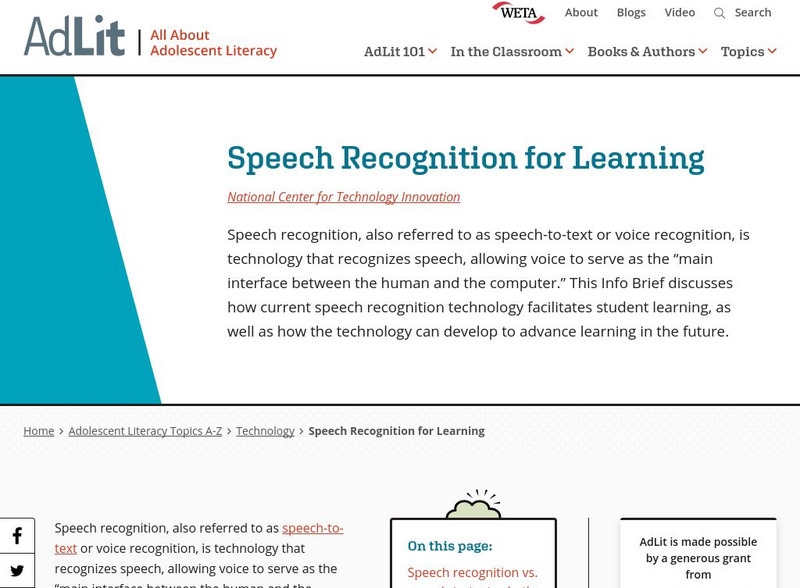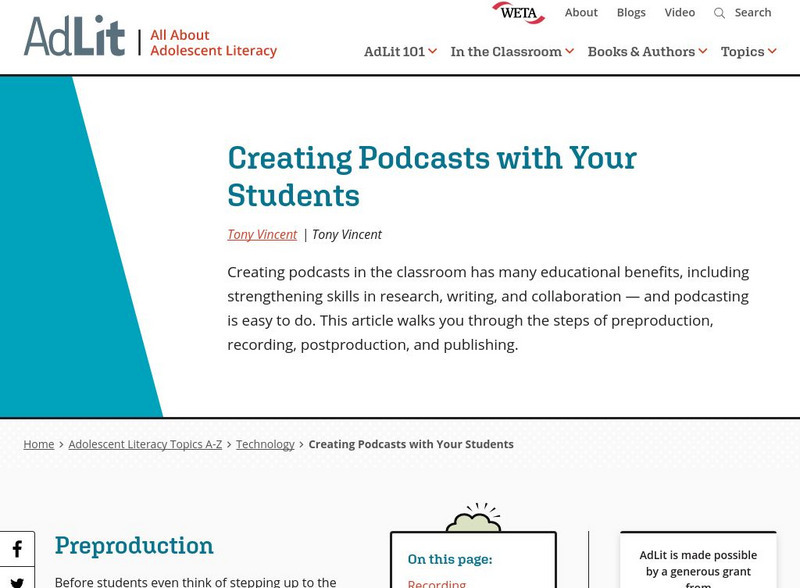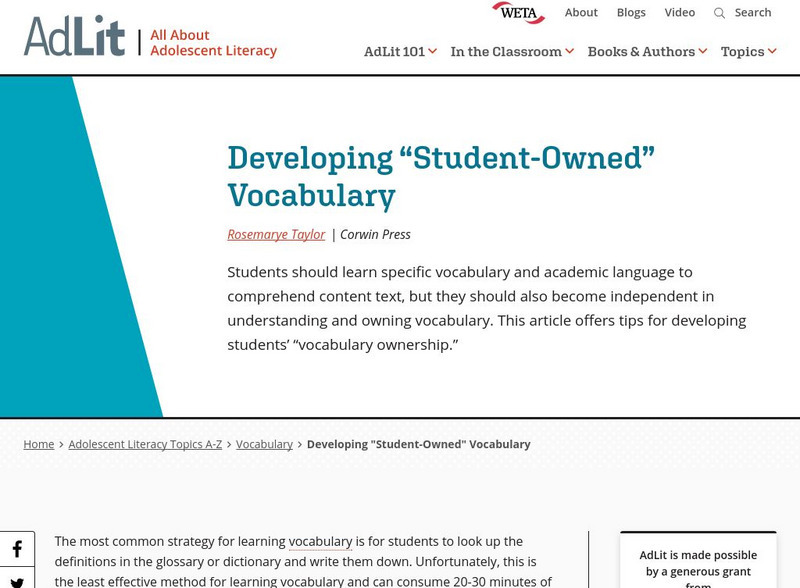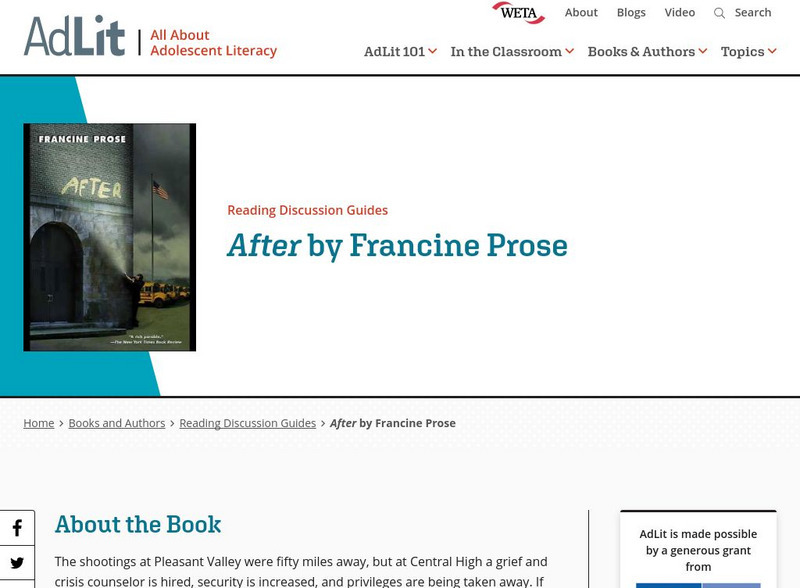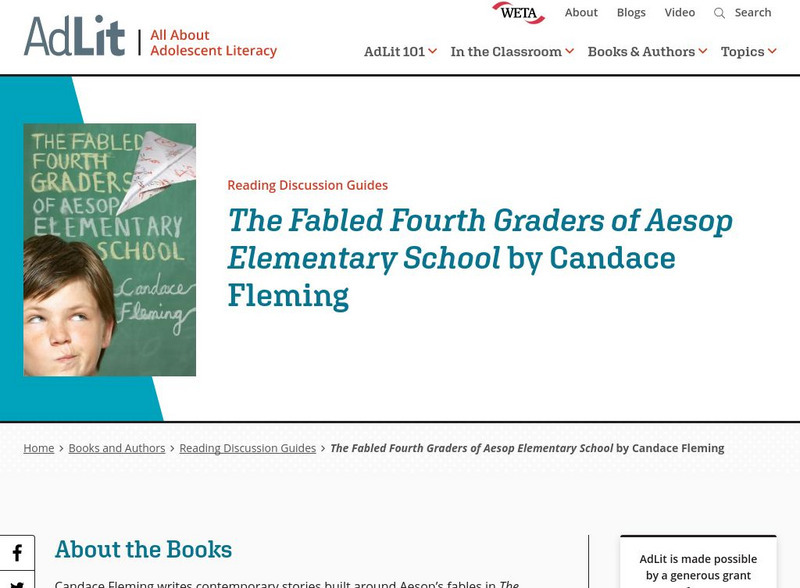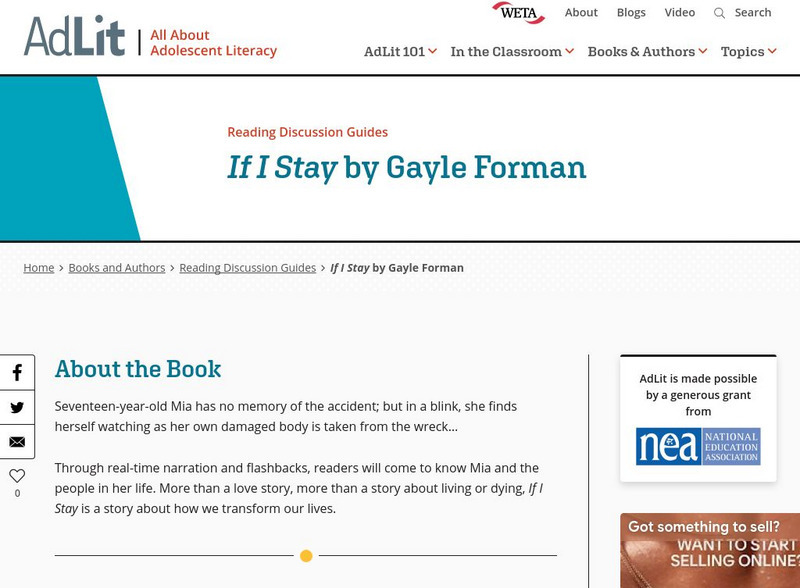AdLit
Ad lit.org: Ensure Successful Student Transitions From the Middle to High School
The 9th grade year is critical to students' success in high school - the influence of a broader number of peers (both positive and negative); the potential of developing bad habits such as skipping class; and entry into a larger,...
AdLit
Ad lit.org: Plan Your Child's Individualized Education Program (Iep)
This checklist prepared by the PACER Center will help parents prepare for and get the most out of Individualized Education Plan (IEP) meetings with school staff.
AdLit
Ad lit.org: Speech Recognition for Learning
Speech recognition, also referred to as speech-to-text or voice recognition, is technology that recognizes speech, allowing voice to serve as the "main interface between the human and the computer." This Info Brief discusses how current...
AdLit
Ad lit.org: Captioned Media: Literacy Support for Diverse Learners
Captioned or subtitled media is a great tool for teachers looking to differentiate classroom instruction - research has shown that ELLs, students with learning disabilities, and students who struggle academically may all benefit from...
AdLit
Ad lit.org: Adolescent Literacy: What's Technology Got to Do With It?
Learn how technology tools can support struggling students and those with learning disabilities to acquire background knowledge and vocabulary, improve their reading comprehension, and increase their motivation for learning.
AdLit
Ad lit.org: Cell Phone Novels: 140 Characters at a Time
Cell phone novels are short stories designed to be read on cellular telephones. This article examines the Japanese trend and its potential in America.
AdLit
Ad lit.org: Creating Podcasts With Your Students
Creating podcasts in the classroom has many educational benefits, including strengthening skills in research, writing, and collaboration - and podcasting is easy to do. This article walks you through the steps of preproduction,...
AdLit
Ad lit.org: Tips for Reading Tutors
The U.S. Department of Education developed this brief guide for reading tutors. It lists ways that tutoring helps both the learner and the tutor, and provides practical tips that can help tutors be more effective in their work.
AdLit
Ad lit.org: Developing "Student Owned" Vocabulary
Students should learn specific vocabulary and academic language to comprehend content text, but they should also become independent in understanding and owning vocabulary. This article offers tips for developing students' "vocabulary...
AdLit
Ad lit.org: Teach Vocabulary by Building Background Knowledge
Students need to develop an extensive vocabulary to read with fluency. In turn, fluency in reading leads to increased comprehension. Fluency also comes from the written language of the reader since the student writes words he or she...
AdLit
Ad lit.org: Some Obstacles to Vocabulary Development
A strong vocabulary, both written and spoken, requires more than a dictionary. In fact, it requires an educational commitment to overcoming four obstacles: the size of the task (the number of words students need to learn is exceedingly...
AdLit
Ad lit.org: The Clarifying Routine: Elaborating Vocabulary Instruction
The more a new vocabulary word is associated with ideas from students' own experience, the more likely the word will become well 'networked' and a permanent part of memory. Making these links involves elaborating definitions of new...
AdLit
Ad lit.org: Questions About Vocabulary Instruction
This article answers four common questions teachers have about vocabulary instruction, including what words to teach and how well students should know vocabulary words.
AdLit
Ad lit.org: An Introduction to Analytical Text Structures
Many students are used to writing narratives - stories, description, even poetry, but have little experience with analytical writing. This article is an introduction to six analytical text structures, useful across content areas. See...
AdLit
Ad lit.org: Teach the Elements of Writing
It's a misconception that writing teachers simply tell students to write and wait to see what happens. Teachers should provide instruction in and exposure to various elements of writing to help students understand what good writing is.
AdLit
Ad lit.org: Help Students Generate Ideas Through Prewriting
Learn how to model a range of prewriting techniques and introduce several mnemonics to help students organize their writing.
AdLit
Ad lit.org: Key Literacy Component: Writing
Students who don't write well aren't able to learn and communicate effectively. This article explains what good writing skills are and how to help struggling young writers gain those skills through proper instruction.
AdLit
Ad lit.org: Teaching Writing to Diverse Student Populations
Writing is a complex operation requiring knowledge of text structure, syntax, vocabulary, and topic, and sensitivity to audience needs; so it is not surprising that many teens find writing challenging. This article identifies the...
AdLit
Ad lit.org: A Summary of "Writing Next"
What does research tell us about effective teaching techniques to help adolescents develop their writing skills? This article summarizes Writing Next, a 2007 study of adolescent writing instruction.
AdLit
Ad lit.org: Understanding Why Students Avoid Writing
If parents and teachers understand why some students hate writing , they can targeted solution to address students' reluctance. Learn some reasons students avoid writing, and how increasing the automaticity of writing skills and...
AdLit
Ad lit.org: Reading Discussion Guide: After by Francine Prose
The shootings at Pleasant Valley were fifty miles away, but at Central High a grief and crisis counselor is hired, security is increased, and privileges are being taken away. If you break the new rules, the punishment is severe. And the...
AdLit
Ad lit.org: Discussion Guide: The Fabled Fourth Graders of Aesop Elementary School
Candace Fleming writes contemporary stories built around Aesop's fables in The Fabled Fourth Graders of Aesop Elementary School. No one wants to teach the fourth graders until the amazing Mr. Jupiter comes along. He undertakes the task...
AdLit
Ad lit.org: Reading Discussion Guide: Black Storm Comin' by Diane Lee Wilson
WANTED: Young, skinny, wiry fellows not over eighteen. Must be expert riders. Willing to risk death daily. Orphans preferred.
AdLit
Ad lit.org: Reading Discussion Guide: If I Stay by Gayle Forman
Seventeen-year-old Mia has no memory of the accident; but in a blink, she finds herself watching as her own damaged body is taken from the wreck




